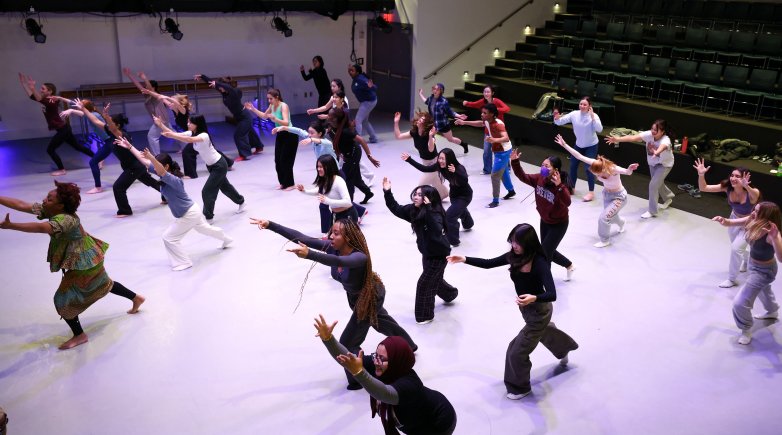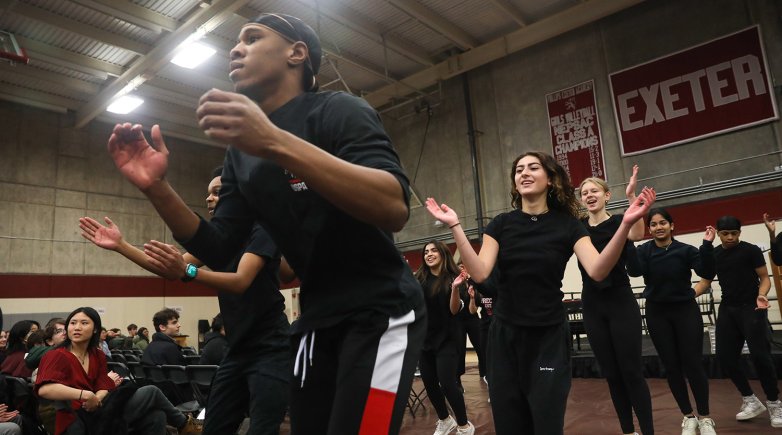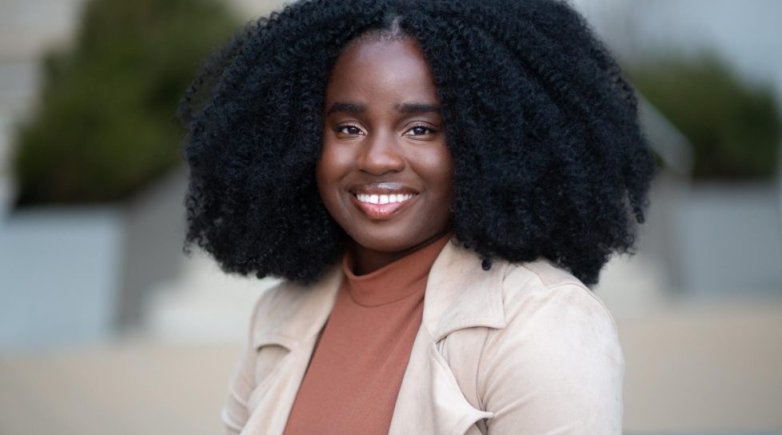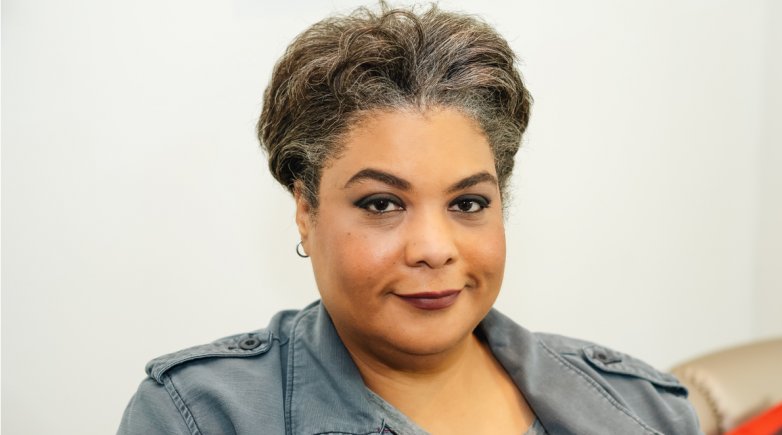Some of King’s most famous statements, Rose pointed out, had been co-opted to endorse views that contradicted his true message, such as the need for color blindness or accusations of reverse discrimination against white people. “There was a twisted effort to invalidate the meanings of his works and words so that we could not have a claim,” she said. In fact, King did not shy away from pointing out the systemic nature of racism, and the ways in which white Americans have benefited from governmental policies in ways that their Black counterparts had no access to.
“Everyone can love and create a love that would help Black people, but you have to know what folks have been through,” Rose said at the conclusion of her remarks, which the audience rewarded with a standing ovation. “If you don't know that, then love actually becomes a capacity and a way to ask us to be quiet and to accept the suffering and the erasure of the love that will actually heal us.”
Rose’s speech was preceded by a performance by the student dance groups Precision and Outkast. The Academy’s Concert Choir, directed by Music Instructor Jerome Walker, sang “Hymn to Freedom,” an ode to the civil rights movement written by Oscar Peterson in 1963, with words by Harriette Hamilton.

“To this day, Dr. King remains a very powerful force in my life,” said Principal Bill Rawson ’71; P’08, in brief opening remarks offered before Rose’s introduction. “I want to express a hope for all of you that through all of the programs that we offer, all the ways that we celebrate and reflect on the life and legacy of Dr. King … that you come to know more and that he comes to have in your lives the important influence that he's had in mine.”
Featured “Black Entrepreneurs” panel
Following Rose’s keynote, students had the opportunity to engage in various workshops organized by the MLK Day Committee and facilitated by both Exeter faculty and staff as well as visiting speakers and alumni. As part of a featured panel in Love Gym, three Black entrepreneurs with businesses in Exeter and the surrounding region sat down with student moderators to answer questions about their respective business journeys and the challenges they’ve faced along the way.
Oneta Modern, owner of The Office Lounge, an upscale neighborhood restaurant and lounge in Dover, New Hampshire, spoke to the student audience of finding inspiration in the example of her mother, a native of South Korea who met her American-born father when he was serving in the military there. When Modern’s father later died in a car accident, her mother learned English in order to support her family on her own.
“She started her own business; she had a little candy store in the mall,” Modern recalled. “She became an entrepreneur herself. I watched my mom do this thing to feed my family, and that's who I became.”
Modern and her fellow panelists spoke of how they sought out and found support as business owners of color in the largely white communities of seacoast New Hampshire, and how they dealt with the prejudice they had encountered over the course of their careers.
“I have a string of failures behind me,” said panelist Daryl Browne, who is the co-owner of Soleil’s Salt Cave, a wellness sanctuary and spa in downtown Exeter, and a former Exeter select board member. “I'm a technologist by trade … and I've done a bunch of tech startups and gone to the highest levels of Google, Apple, Amazon with technology that I created. Each time the door was opened to look at the tech and then they looked at me, like, this couldn't come from you.”

“In the antiques business, 95% of the people don't look like me,” said Lionel Loveless, owner of Officially Knotted Bowties, a business specializing in custom-designed bow ties made from upcycled materials, as well as two antique shops in the area. “I'll get people who come in and say, I need to speak to the owner. I'm like, yes, how can I help you?”
Such prejudice was difficult for Loveless to confront, and he even considered leaving New Hampshire altogether. But at a certain point, he came to the realization that there were enough good people who came into his shop to make up for those who questioned his success or refused to sell antiques to him based on his skin tone. “[Now] I just laugh it off and say, you know what? We have the best shops in the Seacoast, and possibly all of New Hampshire. If you don't want to shop here, that's your loss. Deal with it.”
Workshops across campus
Students also participated in a wide range of workshops held in locations all over campus. The thumping beat of African music and the rhythm of pounding feet filled the third-floor dance studio in the Goel Center for a workshop called “Spirit Moves.” Taught by Ethel Calhoun, a teaching artist for Ailey Arts in Education & Community Programs, it explored how music and dance has played a role in uniting Black communities in Africa as well as the African diaspora, including the Caribbean and Latin America.
Over in the Class of 1945 Library, students gathered in the ground floor Commons area to explore “5 Steps to Becoming a Climate Justice Superhero” with Inemesit Williams, a longtime educator and adviser for In Good Company, a climate justice-centered nonprofit. Williams spoke to the students about the course of King’s career, and the shift he made to expand the battle for Black civil rights to campaign against poverty as well.
“The main thing with climate justice is just acknowledging the fact that climate change is not impacting everybody the same,” Williams told the students. “It's often impacting poor people. It's often impacting people of color more.” After Williams spoke, she had students take time to brainstorm 10 ways they could think about climate action, while considering the intersection of three key questions: “What are you good at?” “What problems need to be solved?” and “What brings you joy?”

Meanwhile, the warm smells of butter and vanilla wafted through the basement of the Elizabeth Phillips Academy Center as English Instructor Courtney Marshall held a workshop on “Food and the Civil Rights Movement.” Students baked pound cake based on the recipe of Georgia Gilmore, who organized a group of women who cooked and baked to support participants in the bus boycotts in Montgomery, Alabama, in 1955–56, as Marshall discussed such topics as segregated restaurants, sit-ins and the “shoebox lunches” that Black passengers carried on trains in an era when they were not allowed to enter the segregated dining cars.
These workshops were just a few of the many offerings attended by Exeter students over the course of the jam-packed MLK Day celebration. During the previous weekend, the campus community also enjoyed several related events, beginning with a special concert, “A Musical Tribute to Dr. Martin Luther King, Jr.” on Sunday in the Forrestall-Bowld Music Center, featuring Symphonia, Concert Choir, Band and the Jazz Ensemble. That evening saw the school’s annual production of UnSilenced, Exeter’s student-run social justice showcase, which energized the crowd in the Goel Center’s Main Stage with a wide range of mediums including song, rap, dance, spoken word, film and poetry.






